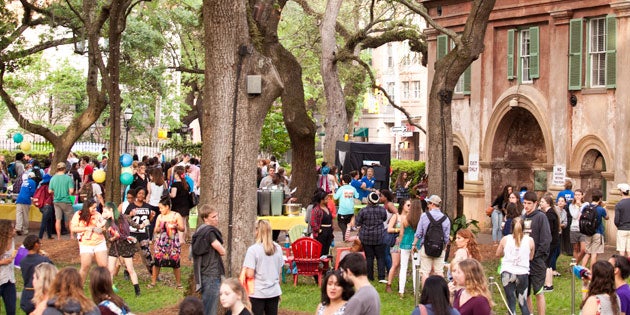With the new academic year in full swing, many students and student organizations will soon be making plans for fall social events.
Event planning – whether for a small get-together among friends or a large-scale shindig – requires forethought and organization, says College of Charleston alum Robert-David Weeks ‘14, CEO and president of RAZ Productions.
A native of Maryland, Weeks graduated with a degree in business administration with a concentration in entrepreneurship. His company has produced and planned numerous events, including corporate networking functions, college social functions, and concerts such as Cobblestone Fest, which was held at the Music Farm here in Charleston.
Here are his 5 tips to help make your next event the talk of the town:
1. Have a Plan
The best place to start when trying to pull together a social function is to create a written plan.
Write down all the aspects you need for the event – the type of venue (inside, outside, ballroom, bar, etc.), whether you need catering, entertainment, and what theme you may want to use for the event.
“Make sure to organize everything in separate categories, and always have a backup plan for each category in case your first option is already booked,” advises Weeks.
2. Create a Budget
The second step is to allocate a budget for each category in your plan.
“Once a budget is created, it allows you to use that information as a benchmark when searching for possible vendors in each category and to narrow your search results, which can speed up the process,” he says.
3. Stay on Budget
A budget does you no good if you don’t follow it.
Amateur event planners often go off track by adding amenities they don’t need or can’t afford. Sure, that extra lighting you saw online could really add to the atmosphere of your event. And, yes, upgrading your sound equipment could make the difference between a wildly successful event and one where all you hear are crickets. But these thoughts can quickly blow up your budget.
“This is trouble,” says Weeks. “It is important to stick with your budget. If you’re second-guessing whether to buy an extra item that would exceed your budget, think back to why you created your budget in the first place.”
4. Make Deadlines
Deadlines will help keep you on task and give you more breathing room down the line room if things do go wrong.
“Without deadlines, many aspects of planning the event may get pushed to the last possible minute,” warns Weeks. “This can cause a lot of unnecessary stress for you and increase the likelihood of things going wrong.”
5. Don’t Panic
No matter how much time you spend planning your social function and obsessively reviewing every last detail, something is bound to go wrong. It could be something as small as forgetting pens for an event sign-in sheet or as big as a torrential rain soaking your outside event.
“The most important thing you can do is to not panic,” says Weeks. “As the main point of contact for the event, people will look to you for guidance and reassurance when unexpected situations arise. Just take a deep breath, and step back from the situation.”
More than likely, someone at another event has already experienced the same problem you are having. As a result, there’s probably a solution closer at hand than you think.








